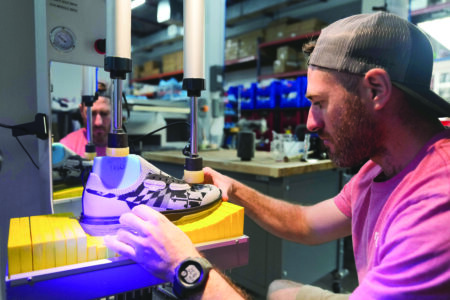NMU College of Business extends accreditation

JOHNSON
MARQUETTE — Northern Michigan University’s College of Business has received a five-year accreditation extension from AACSB International. The distinction demonstrates an ongoing commitment to excellence in teaching, research, curriculum development and learner success.
AACSB stands for Association to Advance Collegiate Schools of Business.
“This is huge for the college and the university as a whole,” said College of Business Dean Carol Johnson in a statement. “Five years of reaccreditation is what we hoped to earn.”
Because the AACSB process emphasizes continuous improvement, all institutions that go through the intensive review process and site visit are advised of areas that they can work on and identify strategies to address them, according to NMU.
Johnson said many schools struggle with setting program outcome goals related to “assurance of learning,” which means developing a definitive gauge of whether graduates are adequately equipped with the knowledge and skill set required to succeed in the professional sector.

This is Northern Michigan University’s Outdoor Learning Area. With NMU starting on the second phase of developing an interim strategic plan, using NMU’s rural location to be a leader in learning and research is a major goal. (Journal photo by Christie Mastric)
“We have made this a priority,” she said. ‘For example, we want to know that our accounting graduates have learned the critical-thinking and communication skills so important right now, along with ethics. We want them to be able to problem-solve. It’s rare that employees get a rubric on how to proceed with a task; a boss typically says ‘I want this done’ and the employee is expected to figure it out. We also need to ensure we’re emphasizing international studies because of the global economy.
“The world continues to change, so maintaining relevance in our curriculum is really important. That is why the College of Business does not silo itself from the rest of campus. We work cooperatively to deliver a quality education. We collaborate with a lot of different departments that offer support courses for our programs. All of this adds to improving our assurance of learning. For example, communication skills are introduced in an English class and reinforced in additional courses along a student’s academic journey. We also held an internal workshop on how to improve outcomes measurement after the AACSB accreditation team visited campus.”
Johnson said other “strategy pillars” moving forward include ensuring an appropriate level and balance of staffing, and offering support for faculty scholarship and professional development activities that support teaching and learning. The college is also focused on determining its societal impact — how it is helping to fulfill the university’s mission related to outreach by enhancing the region through internships and other activities.
Johnson said enhancing the student experience and increasing retention initiatives are additional objectives.
“The accreditation process is a huge endeavor,” Johnson said. “The entire college was involved in this effort. It’s very intensive, but ultimately a good thing because it compels you to evaluate and access your actions and outcomes — what you’re doing well and what areas need improvement. I’m happy to report our enrollment numbers have held pretty steady, and our MBA degree is probably the second-largest graduate program at NMU right now because of our 4+1 program that allows students to earn a bachelor’s in accounting and an MBA in only five years.”
Johnson credits the support from the NMU administration, business faculty, students, external constituents and colleagues and staff across campus with contributing to the successful reaccreditation effort.
She has instilled an annual theme to guide actions of the College of Business that they display on the walls as a reminder. At the height of the pandemic, it was “Survive, Revive and Thrive.” In 2021, it was “Connect, Support and Inspire”: connecting with students in person again, supporting the college internally and externally, and inspiring students to change the world and make a difference.
Johnson was to soon unveil a new theme for the upcoming academic year.
Interim strategic plan being developed
- JOHNSON
- This is Northern Michigan University’s Outdoor Learning Area. With NMU starting on the second phase of developing an interim strategic plan, using NMU’s rural location to be a leader in learning and research is a major goal. (Journal photo by Christie Mastric)
NMU announced that it has embarked on the second phase of developing an interim strategic plan that will provide a direction for its next president. Following NMU Board of Trustees’ approval of the initial proposal presented in late April, steering committees representing faculty, staff and alumni are working over the summer to build action plans for five focus areas identified in the plan.
The committees’ work will also improve the existing language to better define strategies, which are a collection of projects intended to achieve goals within each focus area; the tactics and associated metrics required to accomplish and monitor the strategies; and clear lines of responsibility for the tactics and strategies.
“I am so appreciative of the work of faculty and staff who continue to be significantly engaged in this critical process,” said President Kerri Schuiling, who will remain in the role until NMU completes the national search for her successor, in a statement. “Their work makes clear who is responsible and accountable in moving each strategy forward to reach our goals.”
Jason Nicholas, assistant provost and director of Institutional Effectiveness, said nearly 60 people comprise the focus area steering committees that have been meeting weekly since May.
“The goal is to complete the action plans by the end of the summer and then post them on the president’s strategic planning website,” Nicholas said. “From that point forward, the focus areas will be continually monitored and updates will be shared with leadership and the campus community on a regular basis.”
The five focus areas are:
≤ New markets, New Supports: Identify new recruiting markets and develop new academic offerings to increase enrollment, and support students’ mental and physical health;
≤ Diversity, Equity, Inclusion and Belonging: Create and embrace a university-wide, welcoming culture, recruit/retain students, faculty and staff of diverse backgrounds, and integrate diversity, equity and inclusion in academics;
≤ Rural Roots: Leverage NMU’s unique rural location and expertise to serve as a national leader of related learning and research, and as a resource for U.P. communities, businesses and residents;
≤ Environmental Sustainability: Enhance and grow sustainability efforts and education throughout the planning, operations, education, research and service aspects of the university; and
≤ Emergency Focus Area, COVID-19: Ensure long-term emergency planning success by reflecting what NMU has learned during the pandemic.
“Overall, I believe the interim strategic plan will be helpful to whomever becomes our next president, and it should make a notable difference in all five focus areas over the next two years,” said Professor Dwight Brady, a steering committee member, in a statement. “Engaging in this process not only provided an opportunity to implement new strategies and tactics, it allowed us to have discussions regarding past initiatives like international recruitment and consider ways to improve in these areas.
“While the process was not perfect and can certainly be improved, the collaboration that took place between faculty, staff and members of the administration has created a good model to follow in future planning efforts.”
NMU held engagement sessions in March to obtain feedback from faculty, staff and students on the first draft of the interim strategic plan before it was finalized and presented to the NMU Board of Trustees.







